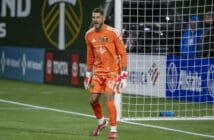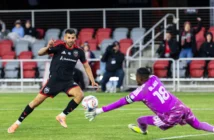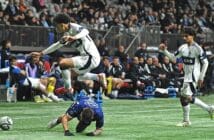
Sounder-down-Under is a look at the beautiful game from the other side of the world, written by Seattle ex-pat Drew Dickson.
Sounder-down-Under: Ethnic violence and the demise of Australia’s Soccer League
by Drew Dickson
The first team I played for in Australia was entirely Serbian, except me (my grandmother’s family came out of Montenegro, so close enough).
I didn’t know this at the start though. I showed up to training and discovered a lot of the team speaking Serbo-Croat with each other. When I got home I told my wife about this oddity of a soccer team and my wife shrugged.
“You find that a lot,” she told me, bursting my excited bubble.
“The various ethnic groups all field a side because they all live together in the same suburb. Just be careful.”

Sounder-down-under Drew Dickson
I admit it, I was a typical male and rolled my eyes at this thought. I had played soccer for years, been on two of Seattle’s All Nations Cup teams, and was part Yugoslavian.
“I can handle myself.” I said, ego inflating.
But as training continued I noticed the other players would crack jokes at their friends for being hairy due to being part Turkish, as though it was a bad thing, or when I was asked where I was from by one player I decided to be polite and ask about his origins too, he informed me he was Serbian.
“Oh cool!” I responded. “Your accent is pure Australian though, how long have you been here?”
He looked startled at me. “I was born here.”
I came home and once again talked to my wife about this.
“These guys are ultra-Serbian.” I told her. “I mean, I get being proud of your ethnicity but they are above and beyond.”
“Teams like that are why the National Soccer League got disbanded.” My wife said as a passing thought.
This was news to me. “Why was it disbanded?”My wife gave me a startling answer – “Ethnic violence.”
To understand the National Soccer League is to understand soccer (yes, they call it soccer too) in Australia.
Though the game and country have English origins, soccer is dominated by the children of post World War II immigrants from the Mediterranean nations. And though the nation of Yugoslavia existed at the time of this exodus, the ethnic rivalries were still raw from a country where Nazi forces pitted the rival factions and religions against each other.
New waves of migrants to Australia were generally settled into a single area so when going between the various suburbs the main squares and streets took on a feel of the populations home nation. Despite having the largest Greek population outside of Athens, our American view of Australians is still the sun-kissed blonds on Bondi beach, and that was also how Australia mostly viewed itself.
Southern Europeans and their strange foods were not fully embraced by society and to this day, many still have a chip on their shoulder. Australia’s national sports of cricket, Aussie Rules and two codes of rugby were not something many fathers from Italy or Malta could play with their sons, but soccer was and a thriving group of teams and leagues.
In Victoria the team from Richmond was all Germans. South Springvale was Greek along with Oakleigh and South Melbourne.
The Italians dotted the landscape in Carlton. One team of committed and communist Yugoslavians fielded a team but by and large the Croatians, Serbians, and Macedonians separated themselves into ethnic pockets and ethnic teams.
But this is just one state. Other states had teams competing among themselves but it was getting to a point where a handful of teams dominated the state competitions and a new challenge was needed. Australia qualified for its first World Cup in 1974 and the league was pushed into motion.
Unfortunately, with a new league came older tensions and conflicts.
Supporters would invade the pitches after games resulting in injuries to opposing players and officials. And in much worse instances firebomb the club house of the rival team. One player commented that away games had an atmosphere of playing in a boiling pot that had no lid.
Fans saw their teams as a bastion of ethnic pride, but as competition heated up, owners saw the money to be made by fielding the best side they could afford and loyalty to clan and kin was set aside.
Soon it was not uncommon for Serbians to play for Greek clubs and Macedonians to be starting for a Croatian club.
What could truly be described as lingering tensions reached full blown animosity after the Balkan Wars in the 1990s. That had seen Serbs killing Croats, Croats killing Serbs and everybody killing Bosnians, as if Yugoslavia had never existed as a harmonious state embracing all.
Kids who had grown up side by side with other ethnics in a growing multicultural society now had the resentment of their parents generation gifted to them, and like many young men from strong family oriented cultures, hate came easy at the instruction of their cultures.
The best example of this would be in 2001 when Melbourne Knights and Perth Glory faced off in the Knights home ground in the first leg of a semi-final. Melbourne Knights are comprised of a mainly Croatian/Catholic fan base and Despotovski is Serbian/Orthodox.
Glory striker Bobby Despotovski was the top scorer in the competition and having a decent outing for the club and the Knights fans decided to let him know of their displeasure.
The fans ripped into him with ethnic slurs in English and Serbo-Croatian, to which towards the end of the game, Despotovski responded to them by giving the three-fingered salute most noted for being used in the Balkan Wars of the 1990s by Orthodox ultra-nationalist groups.
The game ended with a private security guard unconscious, Glory coach Bernd Stange and a female Soccer Australia official both sustaining injuries.
The Australian soccer authorities had to act before soccer grunds became an opportunity for Yugoslav immigrants to vent their vicarious frustrations about the Balkan Wars.
Within three years the league was replaced with a more “family friendly” version that turned away clubs that maintained strong or visible ethnic ties.
South Melbourne Hellas, Sydney Olympic, and Melbourne Knights (the shield of the Knight in the team badge is the white and red checkers of the Croatian coat of arms) refused to deny their heritage and saw their players seek employment in the new A-League and abroad.
Other teams saw their fan base go watch the new league games in central venues and watched as their cash flow caused them to close their clubs.
Thirteen teams were in the competition when the league closed in 2004, and only three would make a return in 2006 when the A-League debuted.
Ironically, of the three teams that survived the revamping of the league, one of them was Perth Glory which had never been a team with a central ethnicity, despite the brawl that made national news in a country that barely raised an eyebrow about soccer until a penalty shootout sent the Socceroos to Germany in 2006.
The ethnic rivalries in the National Soccer League have been replaced in the A-League by state and city derbies that draw large crowds and violence is now outside the scope of most supporters of the top flight.
The game and teams have embraced the international spirit of soccer allowing anyone to attend without fear of speaking the language of their parents.
I did not end up playing for the Serbian team but instead found a club comprised of expats in Collingwood City FC. In my first season I even managed to take home the Best Clubman award for efforts on the pitch.
Also See:
Sounder-down-Under: A fan from Australia lauds LGBT tribute
Sounders FC
Nothing Found
Apologies, but no results were found for the requested archive. Perhaps searching will help find a related post.
Politics & Culture
Nothing Found
Apologies, but no results were found for the requested archive. Perhaps searching will help find a related post.
![Prost International [PINT]](https://prostinternational.com/wp-content/uploads/2021/08/PINTtFontLogoRoboto1536x78.jpg)




